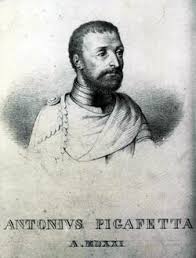
Journal of Antonio Pigafetta as it relates to Borneo part 2
The following part of Pigafetta’s Journal relates to items and foods used in everyday life by the people of Brunei in the early 1500s. The term “moors” is used by the Spanish to refer to any people of the Islamic faith. According to the diary, the Islamic religion must have entered Brunei before the early 1500s.
Junks are their ships, and they are made in the following manner: the bottom part stands about two spans (a span is the distance of a human hand from the tip of the thumb to the tip of the little finger) above the water. The bottom part is made of planks fastened with wooden pegs. Above the planks, they are entirely made of very large bamboo. The junks carry as much cargo as a ship. On both sides, they use bamboo as counterweights. Their masts are made of bamboo and the sails are made of the bark of trees.
Their porcelain is an exceedingly white earth that is left for fifty years under the earth before it is worked, for otherwise it would not be fine. The father buries it for the son. If [poison] is placed in a dish made of fine porcelain, the dish immediately breaks.
The money used by the Moors in those regions is of bronze pierced in the middle so that it may be strung, and on only one side and are of four characters, which are letters of the great king of China and they call that money picis.
They gave us six porcelain dishes for one cathil (which is equivalent to two of our pounds) of quicksilver; one hundred picis for one quire(25 sheets) of writing paper; one small porcelain vase for 160 cathils of metal; one porcelain vase for three knives; one bahar (which is equivalent to 203 cathils) of wax for 160 cathils of bronze; one bahar of salt for eighty cathils of bronze; one bahar of anime to caulk the ships (for no pitch is found in those regions) for forty cathils of metal.Twenty tahils make one cathil.
There the people highly esteemed people who work metal, quicksilver, glass, cinnabar, wool cloth, linens, and all our other merchandise. Iron and spectacles are worked more than more than all the rest.
Those Moors go naked like the others. They drink quicksilver: the sick man drinks it to cleanse himself, and the healthy man to preserve his health.
The king of Brunei has two pearls as large as two hen’s eggs, and they are so round that they will not stand still on a table; I know that for a fact, for when we carried the king’s presents to him, signs were made for him to show them to us. He said that he would show them the next day. Some chiefs said that they had seen them.
Those Moors worship Muhammad, and his law states: do not eat pork; wash the buttocks with the left hand and do not use that hand to eat; do not cut anything with the right hand; sit down to urinate; do not kill fowls or goats without first addressing the sun; cut off the tops of the wings of hens with the little bits of skin that stick up from under the wings and the feet and then split them down the middle; Wash the face with the right hand, but do not clean the teeth with the fingers; and do not eat anything that has been killed unless by them. They are circumcised like the Jews.
Camphor, a kind of balsam, is produced on that island, and it seeps between the wood and the bark, and the drops are as small as [grains of] wheat bran. If it is exposed it gradually evaporates; those people call it capor. Cinnamon, ginger, mirabolans,(Indian Gooseberry) oranges, lemons, jackfruit, watermelons, cucumbers, gourds, turnips, cabbages, scallions, cows, buffaloes, swine, goats, chickens, geese, deer, elephants, horses, and other things are found there.
That island is so large that it takes three months to sail around it in a prau. It lies in a latitude of five and one-fourth degrees toward the Arctic Pole, and in a longitude of 176 and two-thirds degrees from the line of demarcation, and its name is Borneo.
Many thanks to Veronica Chang Schmidt
Borneo History.Net
